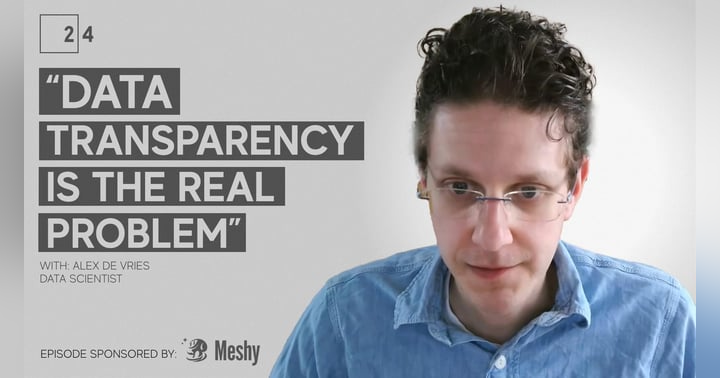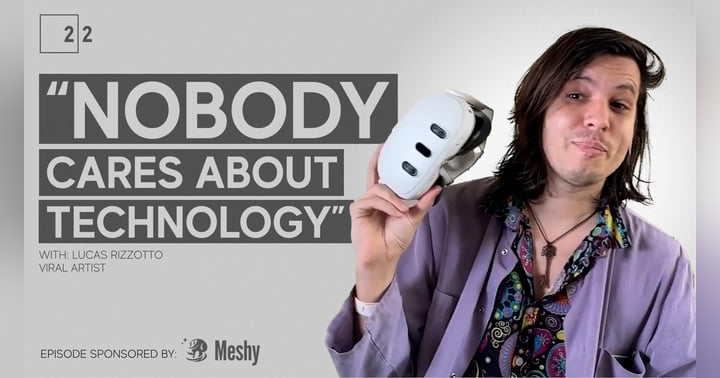
In this Episode
This episode features an in-depth conversation with Anthony Vitillo, known as "The Scarred Ghost," where he discusses the innovative implementation of VR in live music events through his platform, VRRoom. Anthony delves into the technical challenges and creative solutions in creating a VR platform tailored to concerts and events. He also explores the crucial role of community in the development and success of social VR platforms, offering valuable insights for anyone interested in the intersection of technology and social experience.
Questions and Answers from the Interview with Anthony Vitillo
Host: You recently launched a music event on your own platform, VRRoom. What is it and how did it go?
Anthony Vitillo: In 2019, I started working with Luka Chuttolo, the CEO of a company promoting selected movies and festivals. He wanted to experiment with VR. We felt the need for our own platform tailored for concerts, events, and festivals, different from the more general-purpose VRChat... but it was not easy.
Our platform, VRRoom, faced challenges in development – it's super complicated and expensive. But we launched it, despite bugs, with features for socializing and attending events. We hosted a concert with Armani White, an American rap artist. It was an innovative concept in social VR, about the multiverse, offering a new experience of attending a concert in VR.
Host: What changes did you make to your platform to cater to events and musical performances?
Anthony Vitillo: We're focusing on content specific to music, theater, and general events. We're developing tools for live events, including ticketing and monetization, which are crucial for such events. Our SDK offers audio-reactive features and integration with professional tools, focusing on audio quality, setting us apart from other platforms.
Host: Reflecting on your experience when building VRRoom, what would you have done differently?
Anthony Vitillo: Time management was a major challenge – tasks often took longer than expected. Balancing roles as CEO and CTO is tough. Learning how to better predict the time and resources needed to ship a feature is key. Non-technical aspects like marketing, legal issues, and attracting creators were also challenging. I learned the importance of understanding the scale of the project from the start.
Host: How do you recruit artists and performers for your VR concerts?
Anthony Vitillo: We leverage our network, reaching out to creators we've worked with before. For bigger artists like Moneywide, we approach labels and sometimes need intermediaries for introductions. Proving our capability to deliver quality events is essential to gain their trust.
Host: What value do you offer artists in your VR concerts?
Anthony Vitillo: We pitch the novelty and coolness of our VR events. Our focus is on offering unique experiences that artists can showcase on social media. We avoid replicating real-life concerts, instead providing experiences like navigating through parallel universes during a concert, which artists find appealing.
Host: Can you explain more about this concept of the multiverse in your concerts?
Anthony Vitillo: Our concept allows attendees to navigate different environments during a concert, like parallel universes. For example, a concert might start in Philadelphia, then shift to a cartoon world or space, each with the same singer but in a different style. This unique experience is something you can only fully appreciate in VR.
Host: What is the role of community in building your VR platform?
Anthony Vitillo: The community is crucial for any social VR platform. Engaging with the community, understanding their needs, and offering interesting content is key. We're focused on attracting creators to build and host events, as their involvement is vital for the platform's success.
Host: How do you balance your roles as a CTO and a blogger?
Anthony Vitillo: I manage my time efficiently, balancing my responsibilities. I work more on the blog when my CTO duties are lighter, and vice versa. It's about finding the right balance and staying disciplined to manage both roles effectively.
Host: What's your take on mixed reality and its future impact?
Anthony Vitillo: I'm a big fan of mixed reality. In the short term, I don't see it having a huge impact on consumer headset sales, but long-term, the possibilities are immense. Mixed reality applications need time to develop into compelling products. I believe mixed reality will be more than just gaming, offering value in productivity and other areas as well.
Host: What's next for you and The Scarred Ghost?
Anthony Vitillo: We're continuously working on our platform, VRRoom, implementing new features, and planning for the future. On the blogging side, I'm looking to resume writing more frequently and conducting interviews. I'm also planning some travel and always open to new, exciting opportunities.


